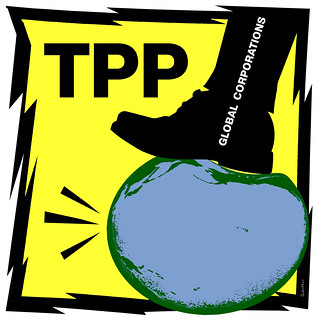Reprinted from Campaign For America's Future
Last November the text of the Trans-Pacific Partnership (TPP) was released to the public on the website of the U.S. Trade Representative (USTR). On January 26, a slightly different "scrubbed" version was put on the website of the official host of the agreement, New Zealand.
The Electronic Frontier Foundation (EFF) discovered a discrepancy between the two versions, located in a footnote that laid out how countries would be allowed some flexibility in the penalties available in cases of "intellectual property" (IP) violations, in this case copyright infringement. This change -- just three letters -- significantly alters the flexibility countries have in choosing how to enforce this IP provision.
On the USTR website, the footnote says this:
"With regard to copyright and related rights piracy provided for under paragraph 1, a Party may limit application of this paragraph to the cases in which there is an impact on the right holder's ability to exploit the work, performance or phonogram in the market."
On the new Zealand website it says this:
"With regard to copyright and related rights piracy provided for under paragraph 1, a Party may limit application of this subparagraph to the cases in which there is an impact on the right holder's ability to exploit the work, performance or phonogram in the market."
The difference is very difficult to spot. The word "paragraph" has been changed to "subparagraph."
According to EFF:
"[I]n its original form the provision exempted a country from making available any of the criminal procedures and penalties listed above, except in circumstances where there was an impact on the copyright holder's ability to exploit their work in the market.
"In its revised form, the only criminal provision that a country is exempted from applying in those circumstances is the one to which the footnote is attached -- namely, the ex officio action provision. Which means, under this amendment, all of the other criminal procedures and penalties must be available even if the infringement has absolutely no impact on the right holder's ability to exploit their work in the market. The only enforcement provision that countries have the flexibility to withhold in such cases is the authority of state officials to take legal action into their own hands."
So what does this change do? In the first revision countries had flexibility on how to implement their IP commitments. In the second they don't have it. EFF calls the change, "a massive extension of the provision's already expansive scope."
This is a major change, hidden in three letters that somehow were snuck into a footnote. EFF writes, "This is no error -- or if it is, then the parties were only in error in agreeing to a proposal that was complete nonsense to begin with. But most likely, this is an underhanded attempt to renegotiate the Trans-Pacific Partnership before its ink is even dry."
The timing of this is interesting. This occurs at the same time as Republicans in Congress are demanding changes to TPP that favor corporate interests, before they will agree to vote to accept TPP. One of the changes they want is ... wait for it ... to get other countries to agree to waive the flexibility in IP enforcement (in this case, on the term of protection for "biologics and other provisions").
Politico's Morning Trade had this story on Tuesday (emphasis added):
"Despite Obama's hopeful comments, Republican aides say they've seen little evidence that the administration is seriously addressing their concerns about biologics and other provisions of the agreement. One thing that might help, POLITICO Pro has been told, is for the administration to develop consistency plans to ensure countries fully implement their intellectual property commitments along the lines of what was done with Malaysia and Vietnam on the labor provisions of the deal."
(Note: You can view every article as one long page if you sign up as an Advocate Member, or higher).





